-
1 September 1414 – Death of William de Ros, 6th Baron de Ros, English politician, Lord High Treasurer
1525-Luther to Henry VIII
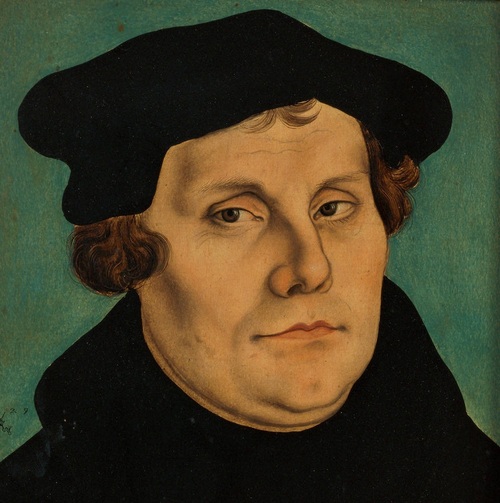
Apologizes for his attack on the King, which had been prompted, not by his own inclination, but by the incitement of those who were unfriendly to his Majesty. Has great hopes in the King's magnanimity. Was led to believe that the King's book was not the work of his Majesty, but of some crafty sophist, who had abused the King's name—præsertim illud monstrum et publicum odium Dei et hominum, cardinalis Eboracensis, pestis illa regni tui. Hears that the King begins to favor the gospel, and is weary of its wretched opposers. Will make a public recantation if Henry will only signify in what way he wishes it to be done. Will rejoice to find the King a professor of Christ and his gospel. Wittemberg, 1 Sept. 1525.
1529 – The Spanish fort of Sancti Spiritu, the first one built in modern Argentina, is destroyed by natives.

1532 – Lady Anne Boleyn is made Marquess of Pembroke by her fiancé, King Henry VIII of England.
"The true order of the ceremony of the creacion of the marchioness of Pembroke."
Directions for the ceremony, which exactly correspond with the account which follows.
Creacion of lady Anne, doughter to therle of Wilteshier, marquesse of Penbroke."
The lady was conveyed by noblemen and the officers of arms at Windsor Castle to the King, who was accompanied by the dukes of Norfolk and Suffolk and other noblemen, and the ambassador of France. Mr. Garter bore her patent of creation; and lady Mary, daughter to the duke of Norfolk, her mantle of crimson velvet, furred with ermines, and a coronet. The lady Marques, who was "in her hair," and dressed in a surcoat of crimson velvet, furred with ermines, with strait sleeves, was led by Elizabeth countess of Rutland, and Dorothy countess of Sussex. While she kneeled before the King, Garter delivered her patent, which was read by the bishop of Winchester. The King invested her with the mantle and coronet, and gave her two patents,—one of her creation, the other of 1,000l. a year. She thanked the King, and returned to her chamber.
1557 – Death of Jacques Cartier, French navigator and explorer

1588 – Birth of Henri, Prince of Condé

2 September 1534-Catherine of Aragon to Thomas Cromwell

My good friend (especial amigo), you have laid me under great obligation by the trouble you have taken in speaking to the King my lord about the coming of my daughter to me. I hope God will reward you, as you know it is out of my power to give you anything but my goodwill. As to the answer given you that the King is content to take her to some house near me, provided I do not see her, I beg you will give him my hearty thanks for the good he does to his daughter and mine, and for the peace of mind (descanso) he has given me. You may assure him that if she were but a mile from me I would not see her, because the time does not permit me to go visiting (que yo ande en vistas), and if I wished it I have not the means (por faltarme aparejo para ello). But you may tell his majesty it was my wish that he should send her where I am, as the comfort and cheerfulness she would have with me would be half her cure (seria media salud para ella). I have found this by experience, being ill of the same sickness, and as my request was so reasonable and touched so greatly the honor and conscience of the King, I did not think it would be denied me. Do not forbear, I beseech you, to do what you can that it may be so. I have heard that he had some suspicion of her security,—a thing so unreasonable that I cannot believe it entered into his heart, nor do I think he has so little confidence in me. If such a thing be assumed, I beg you to tell his majesty it is my fixed determination to die in this kingdom; and I offer my person as security that if such a thing be attempted he may do justice upon me as the most traitorous woman that ever was born.
3 September 1420 – Death of Robert Stewart, Duke of Albany

1467 –Death of Eleanor of Portugal, Holy Roman Empress

1499 – Birth of Diane de Poitiers,mistress of Henry II of France
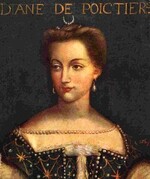
1507 --Death of Thomas Savage,King's Chaplain and an Archbishop of York.He handled the marriage ceremony of Arthur, Prince of Wales to Catherine of Aragon.
"A Lancastrian in politics, he was much trusted and employed by Henry VII....he was a courtier by nature, and took part in the great ceremonies of his time, the creation of Prince Henry as Duke of York, the meeting with the Archduke Philip, and the reception of Catherine of Aragon."
1553 – Edward Courtenay was created Earl of Devon.
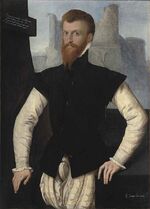
source:wikipedia,http://www.british-history.ac.uk/
-
28 August 1481 – Death of Afonso V of Portugal
1521 – The Ottoman Turks occupy Belgrade.
1524 – The Kaqchikel Maya rebel against their former Spanish allies during the Spanish conquest of Guatemala.
1542 – Turkish–Portuguese War (1538–1557): Battle of Wofla: The Portuguese are scattered, their leader Christovão da Gama is captured and later executed.
1565 – Pedro Menéndez de Avilés sights land near St. Augustine, Florida and founds the oldest continuously occupied European-established city in the continental United States.
1592 – Birth of George Villiers, 1st Duke of Buckingham, English politician, Lord Lieutenant of Buckinghamshire
1609 – Henry Hudson discovers Delaware Bay.
1619 – Ferdinand II is elected emperor of the Holy Roman Empire.
29 August 1442 – Death of John VI, Duke of Brittany
1475 – The Treaty of Picquigny ends a brief war between the kingdoms of France and England.
The Treaty of Picquigny was a peace treaty negotiated on 29 August 1475 between the Kingdom of England and the Kingdom of France. It followed from an invasion of France by Edward IV of England in alliance with Burgundy and Brittany. It left Louis XI of France free to deal with the threat posed by Charles the Bold, Duke of Burgundy.
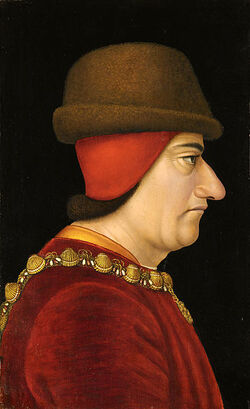

1484 – Pope Innocent VIII succeeds Pope Sixtus IV.
1498 – Vasco da Gama decides to depart Calicut and return to Kingdom of Portugal.
1521 – The Ottoman Turks capture Nándorfehérvár
1526 – Death of Louis II of Hungary
1529-Papal breve suspending the further hearing of the King's cause till Christmas. Rome, 29 Aug. 1529.

1533 – Spaniard Francisco Pizarro executes Atahualpa, the last Sapa Inca (sovereign emperor) of the Inca Empire.
1534-Chapuys to Charles V.
I suppose your majesty has been fully informed of the success of the revolt of young Kildare; nevertheless I may mention a few particulars. According to the rumor in Court, he has now at his devotion all or nearly all the lords that the King used to have in Ireland, unless it be the earl of Ossory (Dansrey), whom for some reason he will not yet press, and the grand prior of St. John's. He has given order, on pain of death, that all the English shall leave the country in a certain time. Those of the towns where he has entered have sworn fealty to the Pope, to your majesty and to him: the rest of the towns, where he had not yet been, were summoned to do the like, and it is expected they will without further pressure. All the English fishermen that he can lay hands on he puts to death, to frighten the others from coming there, knowing the great importance to the English of the fishery of that coast, which is of such importance that those of Cornwall, as I am told, would rather lose their tin mines than the right of the said fishery. The report is also common that there is an ambassador of your majesty in Ireland, about which I have been much questioned, and have said I did not know, and that if it were so, it might be to remedy some new attempt of the Irish against the Spaniards there. From the presumption above mentioned that your majesty has better information, I have not inquired of these news very minutely, but I will keep the subject in view. The King has been trying to dissemble matters, both, as I suspect, for fear this people should take example from the others, and also in the hope of setting things right by gentleness, promising Kildare the deliverance of his father and himself, pardon both for the archbishop's murder and for all the rest; but he refuses all amity. The King, therefore, within the last five or six days has ordered his Council and some other persons to come to him at 40 miles from here to consider of a remedy, and I am told this morning that he has ordered six vessels to be got ready, and was going to send 12,000 men thither under the charge of Suffolk or of my lord Felix, governor of Wales, although some think, whatever those here pretend, they will scarcely send thither this winter, for it is already late in the season, and it will require a long time to gather the said number of men, who will not readily go where there is nothing to be got but blows; and, moreover, if Kildare held as much as they say he does, they will require to send three times the number, and lay in an enormous store of victuals, which cannot be done all at once. It is inconceivable how people are delighted at the success of these affairs in Ireland, thinking it a very good beginning to remedy matters here. Still less can you imagine their anxiety lest your majesty should lose so good an opportunity. Every day I am importuned to write to you about it from innumerable quarters, and am assured that on the least rising got up by your majesty the whole realm would declare in your favor. This was again declared to me yesterday by a good and virtuous lord, who though he was very ill, sent to me to beg that I would meet him in the fields as if by accident, which I did; and he told me that eight days since Cromwell, among other matters, said to him it was folly to fear that your majesty would attempt war, for neither Flanders nor Spain would ever consent to it, for fear of their trade, or, if that did not serve, the death of the Queen and Princess would put an end to all disputes. You will thus see that their aim is to get rid of these ladies. I therefore answered, in order that he might show it to Cromwell, what I had once told the King himself, that if the said ladies were to die, your majesty would have a still more righteous quarrel than now, which reasons the said lord was very glad to hear, that he might use them to Cromwell and others. The same language that Cromwell used about the death of the said ladies, the earl of Wiltshire also used lately to one who told him that your majesty might be angry at their illtreatment. Some fear that in the coming parliament, which will reassemble in November, the King will get them to declare the Queen and Princess to have incurred the penalty in the statute made against them, so as to have grounds for treating them still worse.
The Princess, understanding of late that the King intended she should remove and accompany the Bastard, sent to me three times in less than 24 hours to know what to do. I wrote back to her each time resolving her seruples that even if she did obey the King without opposition or protestation, all that the King desired in the respect could do no prejudice to the protestations already made. Nevertheless I thought that, to prevent her father and his lady imagining she was worn-out and conquered by illtreatment, she should speak boldly and with her accustomed modesty, but not go to the extremity of allowing herself to be taken by force, as on the former occasion. I wrote to her at full length what she ought to say; not that it was necessary, considering her good sense, but because she desired me. She played her part so well, that the Comptroller promised her she should not go after the other. Nevertheless, on her coming to the first door of the lodging there was the litter of the Bastard, and the Princess was compelled to go out after her, the Comptroller allowing her, as soon as she mounted, to go before or after, as she pleased; on which account she suddenly pushed forward, and arrived at Greenwich about an hour before the Bastard. When she came to enter the barge, she took care to secure the most honorable place. I had intimated to her that I would go to Greenwich to see her pass; and she sent to beg me to do so as earnestly as she could. I was there accordingly in disguise; and it was a great pleasure to see such excellent beauty accompanied by heroic bearing, which all the more increased the pity to see her so treated.
The ambassadors of Lubeck, I understand, are very weary at being kept here so long, and say plainly that if they had known it they would not have come on any account. They expected to have obtained a loan of money from the King for their war with Denmark, which the King offered to give provided the Easterlings would make it their own debt. But this has not been agreed to; and I expect they will get no money. The courier who, as I lately wrote, had left for Rome, finding in the French Court that the Pope was not dead, went no further. Gregory de Casal stayed at the said Court for the same reason, and I think will go straight to Venice, to reside there as the King's ambassador, and his brother, who was there, will go to the Waywode, by whose means some think this king will intrigue with the Turk if he can, to your prejudice.
All the Observants of this kingdom have been driven out of their monasteries for refusing the oath against the Holy See, and have been distributed in several monasteries, where they are locked up in chains and worse treated than they could be in prison. London, 29 Aug. 1534.
1538 - Arrest of Geoffrey Pole on suspicion of being in contact with his brother, Cardinal Reginald Pole.
1541 – The Ottoman Turks capture Buda, the capital of the Hungarian Kingdom.
30 August 1464 – Pope Paul II succeeds Pope Pius II as the 211th pope.
1483 –Death of Louis XI of France

1525-The Treaty of the More was concluded on 30 August 1525 between Henry VIII of England and the interim French government of Louise of Savoy. It was celebrated by Henry and the French ambassadors at The More, Hertfordshire, a castle owned by Henry's chief minister, Cardinal Wolsey.
England, with Wolsey negotiating, agreed to give up some territorial claims on France, receiving in return a pension from the French of £20,000 a year. France settled what was owed to Henry VIII's sister, Mary, dowager queen of France. England also agreed to work to secure the release of King Francis of France, then held prisoner by Charles V, Holy Roman Emperor and King of Spain.
England had been troubled by the threat of a renewal of the "Auld Alliance" between France and Scotland, and France agreed to prevent the Scottish Duke of Albany from returning to Scotland.
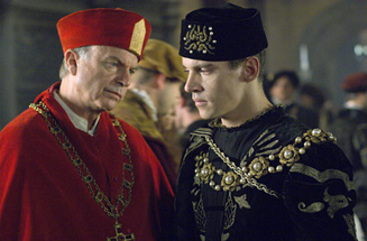
1548-Birth of Mary Seymour.She was the only daughter of Thomas Seymour, Baron Seymour of Sudeley, and Catherine Parr, widow of Henry VIII of England. Although Katherine was married four times, Mary was her only child. Complications from Mary's birth would claim the life of her mother on 5 September 1548, and her father was executed less than a year later for treason against Edward VI.In 1549, the Parliament of England passed an Act removing the attainder placed on her father from Mary, but his lands remained property of the Crown.As her mother's wealth was left entirely to her father and later confiscated by the Crown, Mary was left a destitute orphan in the care of Katherine Willoughby, Duchess of Suffolk, who appears to have resented this imposition.After 1550 Mary disappears from historical record completely, and no claim was ever made on her father's meager estate, leading to the conclusion that she did not live past the age of two.
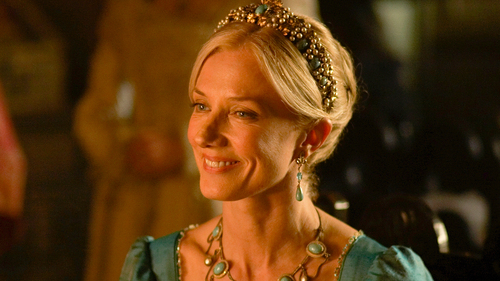
1580 –Death of Emmanuel Philibert, Duke of Savoy
31 August 1422 – King Henry V of England dies of dysentery while in France. His son, Henry VI becomes King of England at the age of 9 months.
1422 – Death of Henry V of England
source:http://www.onthisdayintudorhistory.com/,wikipedia,http://www.british-history.ac.uk/
-
26 August 1346 – Killed in the Battle of Crécy:
Charles II, Count of Alençon
Louis I, Count of Flanders
Rudolph, Duke of Lorraine
John of Bohemia
1444 – Battle of St. Jakob an der Birs: A vastly outnumbered force of Swiss Confederates is defeated by the Dauphin Louis (future Louis XI of France) and his army of 'Armagnacs' near Basel.

1462 – Death of Catherine Zaccaria, Despotess of the Morea
1466 – A conspiracy against Piero di Cosimo de' Medici in Florence, led by Luca Pitti, is discovered.

1469 –Birth of Ferdinand II of Naples
1498 – Michelangelo is commissioned to carve the Pietà.

1533 – Queen Anne Boleyn took to her chamber at Greenwich Palace in preparation for the birth of her first child.

1551 –Death of Margaret Leijonhufvud, wife of Gustav I of Sweden

1555 - Mary I and her husband, Philip of Spain, departed from Whitehall in preparation for Philip’s return to the Low Countries.

1595 – Death of António, Prior of Crato
27 August 1450 – Death of Reginald West, 6th Baron De La Warr, English politician
1471 – Birth of George, Duke of Saxony
1487 – Birth of Anna of Brandenburg
1590 – Death of Pope Sixtus V

1593 – Pierre Barrière fails in his attempt to assassinate King Henry IV of France.

source:wikipedia,http://www.onthisdayintudorhistory.com/
-
23 August 1305 – Sir William Wallace is executed for high treason at Smithfield in London.
1521 – Christian II of Denmark is deposed as king of Sweden and Gustav Vasa is elected regent.
1541 – French explorer Jacques Cartier lands near Quebec City in his third voyage to Canada.
1572 – French Wars of Religion Mob violence against Huguenots in Paris results in the St. Bartholomew's Day massacre.

24 August 1358 – Birth of John I of Castile
1393 – Birth of Arthur III, Duke of Brittany
1456 – The printing of the Gutenberg Bible is completed.

1482 – The town and castle of Berwick upon Tweed is captured from Scotland by an English army
1507 – Death of Cecily, Viscountess Welles, she was an English Princess and the third, but eventual second surviving, daughter of Edward IV, and his queen consort, née Lady Elizabeth Woodville, daughter of Richard Woodville, 1st Earl Rivers and Jacquetta of Luxembourg.

1561 – Willem of Orange marries duchess Anna of Saxony.
25 August 1482 – Death of Margaret of Anjou.She was the wife of King Henry VI of England. As such, she was Queen consort of England from 1445 to 1461 and again from 1470 to 1471. She also claimed to be Queen consort of France from 1445 to 1453. Born in the Duchy of Lorraine, into the House of Valois-Anjou, Margaret was the second eldest daughter of René I of Naples and Isabella, Duchess of Lorraine.She was one of the principal figures in the series of dynastic civil wars known as the Wars of the Roses and at times personally led the Lancastrian faction. Due to her husband's frequent bouts of insanity, Margaret ruled the kingdom in his place. It was she who called for a Great Council in May 1455 that excluded the Yorkist faction headed by Richard, Duke of York, and thus provided the spark that ignited a civil conflict that lasted for over thirty years, decimated the old nobility of England, and caused the deaths of thousands of men, including her only son Edward of Westminster, Prince of Wales, at the Battle of Tewkesbury in 1471.Margaret was taken prisoner by the victorious Yorkists after the Lancastrian defeat at Tewkesbury. In 1475, she was ransomed by her cousin, King Louis XI of France. She went to live in France as a poor relation of the French king, and she died there at the age of 52.

1537 – The Honourable Artillery Company, the oldest surviving regiment in the British Army, and the second most senior, is formed.
1540-Birth of Catherine Seymour, Countess of Hertford , born Lady Catherine Grey, was the younger sister of Lady Jane Grey. A granddaughter of Henry VIII's sister Mary, she was a potential successor to her cousin, Queen Elizabeth I of England, but incurred Elizabeth's wrath by her secret marriage to Edward Seymour, 1st Earl of Hertford. Following her arrest when the queen was informed of her clandestine marriage, she lived in captivity until her death, having borne two sons in the Tower of London.

1554 – Death of Thomas Howard, 3rd Duke of Norfolk.He was a prominent Tudor politician. He was an uncle of two of the wives of Henry VIII: Anne Boleyn and Catherine Howard, and played a major role in the machinations behind these marriages. After falling from favour in 1546, he was stripped of the dukedom and imprisoned in the Tower, avoiding execution when the King died. He was released on the accession of Queen Mary I. He aided Mary in securing her throne, setting the stage for alienation between his Catholic family and the Protestant royal line that would be continued by Queen Elizabeth I.

1580 – Battle of Alcântara. Spain defeats Portugal.
1609 – Galileo Galilei demonstrates his first telescope to Venetian lawmakers.
source:wikipedia
-
20 August 1467 – The Second Battle of Olmedo takes places as part of a succession conflict between Henry IV of Castile and his half-brother Alfonso, Prince of Asturias.
1509 – Birth of Sir William Stanford , judge and legal writer.
1589 - Marriage of James VI of Scotland and Anne of Denmark by proxy at Kronborg Castle, Helsingør, Denmark.

1599 - Death of Sir Thomas Norris, English soldier, made Lord President of Munster in Ireland
21 August 1157 –Birth of Alfonso VII of León and Castile
1271 –Birth of Alphonse, Count of Poitiers
1535 - On Saturday 21 August 1535, Henry VIII and Anne Boleyn visited Nicholas Poyntz at Acton Court, Iron Acton, Gloucestershire. Poyntz had built a special new lodging for his royal guests which still survives. It contained three first floor state rooms and one of these still has painted decoration by an artist of the Tudor court. These state rooms connected to the older house by a covered walkway called a 'pentice.' Archaeological excavations found fragments of precious Venetian glass and maiolica which Nicholas probably bought for the visit. The evidence of lengthy preparations by Nicholas at Acton shows that Henry's progress in the west of England was planned in advance


Acton Court is a recently restored Tudor house on Latteridge Lane, Iron Acton, South Gloucestershire, England. It is a Grade I listed building.
The Poyntz family owned the property from 1364 until 1680. Nicholas Poyntz (died 1557) added the East Wing onto the existing moated manor house shortly before 1535. Construction took about 9 months to complete. Subsequently, the wing was lavishly and fashionably decorated to impress Henry VIII. The king and his second wife, Anne Boleyn, stayed in the house in 1535, during a tour of the West Country. Building work continued at Acton Court until Nicholas died in 1557.
When the direct line of succession ended in 1680, the house was sold. It was reduced in size and converted for use as a tenanted farmhouse. Due to neglect, the house gradually fell into a dilapidated state. By the end of the 20th century, practically only the East Wing survived. However, the neglect resulted in a rare example of Tudor royal state apartments being preserved virtually intact. An extensive restoration was completed only recently.
Prior to the restoration, English Heritage commissioned a comprehensive study, published as K. Rodwell and R. Bell, Acton Court: The evolution of an early Tudor courtier's house (2004).
source:wikipedia

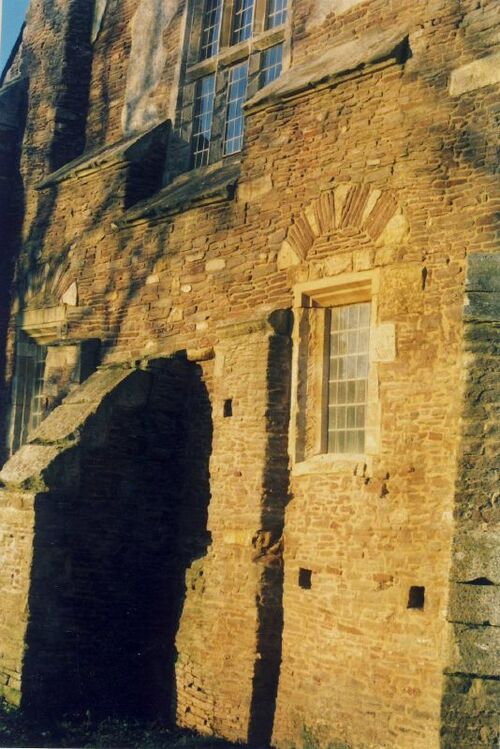
22 August 1304 – Death of John II, Count of Holland
1350 – Death of Philip VI of France
1358 –Death of Isabella of France

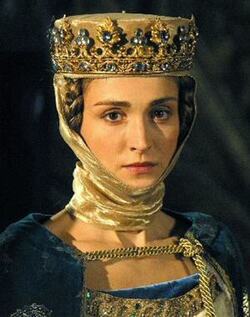
1412 – Death of Frederick II, Elector of Saxony

1456 – Death of Vladislav II of Wallachia
1485 – Death of Richard III of England

1485 – The Battle of Bosworth Field, the death of Richard III and the end of the House of Plantagenet.
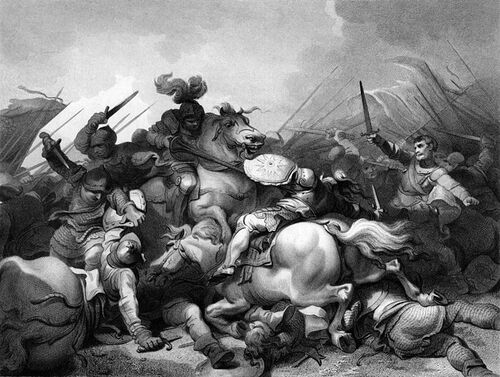
The Battle of Bosworth Field was the last significant battle of the Wars of the Roses, the civil war between the Houses of Lancaster and York that raged across England in the latter half of the 15th century. Fought on 22 August 1485, the battle was won by the Lancastrians. Their leader Henry Tudor, Earl of Richmond, by his victory became the first English monarch of the Tudor dynasty. His opponent, Richard III, the last king of the House of York, was killed in the battle. Historians consider Bosworth Field to mark the end of the Plantagenet dynasty, making it a defining moment of English and Welsh history.
Richard's reign began in 1483 when he was handed the throne after his twelve-year-old nephew Edward V, for whom he was acting as Lord Protector, was declared illegitimate and ineligible for the throne. The boy and his younger brother disappeared in mysterious circumstances, and Richard's support was eroded by rumours of his involvement in the death of his wife. Across the English Channel in Brittany, Henry Tudor, a descendant of the greatly diminished House of Lancaster, seized on Richard's difficulties so that he could challenge Richard's claim to the throne. Henry's first attempt to invade England was frustrated by a storm in 1483, but at his second attempt he arrived unopposed on 7 August 1485 on the southwest coast of Wales. Marching inland, Henry gathered support as he made for London. Richard mustered his troops and intercepted Henry's army south of Market Bosworth in Leicestershire. Thomas, Lord Stanley, and Sir William Stanley brought a force to the battlefield, but held back while they decided which side it would be more advantageous to support.
Richard divided his army, which outnumbered Henry's, into three groups (or "battles"). One was assigned to the Duke of Norfolk and another to the Earl of Northumberland. Henry kept most of his force together and placed it under the command of the experienced Earl of Oxford. Richard's vanguard, commanded by Norfolk, attacked but struggled against Oxford's men, and some of Norfolk's troops fled the field. Northumberland took no action when signalled to assist his king, so Richard gambled everything on a charge across the battlefield to kill Henry and end the fight. Seeing the king's knights separated from his army, the Stanleys intervened; Sir William led his men to Henry's aid, surrounding and killing Richard. After the battle, Henry was crowned king below an oak tree in nearby Stoke Golding, now a residential garden.
Henry hired chroniclers to portray his reign favourably; the Battle of Bosworth was popularised to represent the Tudor dynasty as the start of a new age. From the 15th to 18th centuries the battle was glamorised as a victory of good over evil. The climax of William Shakespeare's play Richard III provides a focal point for critics in later film adaptations. The exact site of the battle is disputed because of the lack of conclusive data, and memorials have been erected at different locations. The Bosworth Battlefield Heritage Centre was built, in 1974, on a site chosen based on a theory that has since been challenged by several scholars and historians. In October 2009, a team of researchers, who had performed geological surveys and archaeological digs in the area from 2003, suggested a location two miles (3.2 km) southwest of Ambion Hill.
1532-Death of Richard Warham.He was the Archbishop of Canterbury from 1503 to his death.
1545-Death of Charles Brandon, 1st Duke of Suffolk.He was the son of Sir William Brandon and Elizabeth Bruyn. Through his third wife Mary Tudor he was brother-in-law to Henry VIII. His father was the standard-bearer of Henry Tudor, Earl of Richmond (later King Henry VII) and was slain by Richard III in person at the battle of Bosworth Field. Suffolk died of unknown causes at Guildford.Before 7 February 1507 he married Margaret Neville.In early 1508 in a secret ceremony at Stepney, and later publicly at St Michael's, Cornhill, he married Margaret Neville's niece, Anne Browne .He contracted to marry Elizabeth Grey, 5th Baroness Lisle. He was thus created 1st Viscount Lisle of the third creation in 1513, but the contract was annulled, and he surrendered the title before 1519 or in 1523.In May 1515 he married Mary Tudor, Queen Dowager of France , by whom he had two sons who died young, and two daughters:Frances,mother of Jane Grey and Eleanor.On 7 September 1533 he married Catherine Willoughby, 12th Baroness Willoughby de Eresby , by whom he had two sons, both of whom died young of the sweating sickness

1552 - Edward VI visits Christchurch on his royal progress.

1535 - Anne Boleyn and Henry VIII visited the Walsh family at Little Sodbury Manor in the village of Little Sodbury, South Gloucestershire.

From Nicholas Kingsley, The Country Houses of Gloucestershire: Volume One, 1500-1660 (London and Frome, 2001), p. 137-8:
’The house occupies a dramatic position on the westward-facing escarpment of the Cotswold, and enjoys spectacular views over South Gloucestershire, but has paid for its exposed position by being twice struck by lightning, with consequent effects on its architectural history.
The Stanshawe family would seem to have been resident at Little Sodbury by c.1430, and the existing hall may be almost that early. It is remarkably lofty, having an open timber roof with four tiers of windbraces. A partially restored wooden screen still divides the hall proper from the screens passage. Above this a closely-studded timber partition conceals a large room (as at Buckland rectory). The oriel window in the east wall is an original feature reconstructed during the early 20th century using much of the original stonework.
In about 1491, Little Sodbury passed by marriage into the hands of John Walsh of Olveston, who became the Crown’s receiver for the Berkeley family estates, and prospered mightily under royal favour. His son, Sir John, was the King’s champion at the coronation of Henry VIII in 1509, and subsequently employed William Tyndale as tutor to his children: Tyndale’s translation of the Bible may have been begun at Little Sodbury. Either Sir John Walsh or his father added the block to the right of the porch, with its charming first-floor oriel windows, and also altered the buildings north of the hall.
In 1608 the manor of Little Sodbury was sold to Thomas Stephens, who was attorney to the royal children, Prince Henry and Prince Charles, and who amassed a vast patrimony which he divided between his three sons. Edward Stephens received Little Sodbury and the adjoining estates of Lyegrove and, at sometime around 1630-40, added the stair case south of the hall and redecorated the rooms in the south wing to which it gave better access. Several of these rooms still have fine chimneypieces, and there was once another which was subsequently removed to Lyegrove, where it graces the entrance hall.....’

1553 - Stephen Gardiner, Bishop of Winchester, was made Lord Chancellor by Mary I.

1553 – Death of John Dudley, 1st Duke of Northumberland, English general, admiral, and politician, who led the government of the young King Edward VI from 1550 until 1553, and unsuccessfully tried to install Lady Jane Grey on the English throne after the King's death. The son of Edmund Dudley, a minister of Henry VII executed by Henry VIII, John Dudley became the ward of Sir Edward Guildford at the age of seven. He grew up in Guildford's household together with his future wife, Guildford's daughter Jane, with whom he was to have 13 children. Dudley served as Vice-Admiral and Lord Admiral from 1537 until 1547, during which time he set novel standards of navy organisation and was an innovative commander at sea. He also developed a strong interest in overseas exploration. Dudley took part in the 1544 campaigns in Scotland and France and was one of Henry VIII's intimates in the last years of the reign. He was also a leader of the religious reform party at court.
In 1547 Dudley was created Earl of Warwick and, with the Duke of Somerset, England's Lord Protector, distinguished himself in the renewed Scottish war at the Battle of Pinkie. During the country-wide uprisings of 1549 Dudley put down Kett's Rebellion in Norfolk. Convinced of the Protector's incompetence, he and other privy councillors forced Somerset out of office in October 1549. Having averted a conservative reaction in religion and a plot to destroy him alongside Somerset, Dudley emerged in early 1550 as de facto regent for the 12-year-old Edward VI. He reconciled himself with Somerset, who nevertheless soon began to intrigue against him and his policies. Somerset was executed on largely fabricated charges, three months after Dudley had been raised to the Dukedom of Northumberland in October 1551.
As Lord President of the Council, Dudley headed a distinctly conciliar government and sought to introduce the adolescent King into business. Taking over an almost bankrupt administration, he ended the costly wars with France and Scotland and tackled finances in ways that led to some economic recovery. To prevent further uprisings he introduced countrywide policing on a local basis, appointing Lords Lieutenants who were in close contact with the central authority. Dudley's religious policy was—in accordance with Edward's proclivities—decidedly Protestant, further enforcing the English Reformation and promoting radical reformers to high Church positions.
The 15-year-old King fell ill in early 1553 and excluded his half-sisters Mary and Elizabeth, whom he regarded as illegitimate, from the succession, designating non-existent, hypothetical male heirs. As his death approached, Edward changed his will so that his Protestant cousin Jane Grey, Northumberland's daughter-in-law, could inherit the Crown. To what extent the Duke influenced this scheme is uncertain. The traditional view is that it was Northumberland's plot to maintain his power by placing his family on the throne. Many historians see the project as genuinely Edward's, enforced by Dudley after the King's death. The Duke did not prepare well for this occasion. Having marched to East Anglia to capture Princess Mary, he surrendered on hearing that the Privy Council had changed sides and proclaimed Mary as Queen. Convicted of high treason, Northumberland returned to Catholicism and abjured the Protestant faith before his execution. Having secured the contempt of both religious camps, popularly hated, and a natural scapegoat, he became the "wicked Duke"—in contrast to his predecessor Somerset, the "good Duke". Only since the 1970s has he also been seen as a Tudor Crown servant: self-serving, inherently loyal to the incumbent monarch, and an able statesman in difficult times.

1559 – Bartolomé Carranza, Spanish archbishop, is arrested for heresy.
1572 – Death of Thomas Percy, 7th Earl of Northumberland, English leader of the Rising of the North(The Rising of the North of 1569, also called the Revolt of the Northern Earls or Northern Rebellion, was an unsuccessful attempt by Catholic nobles from Northern England to depose Queen Elizabeth I of England and replace her with Mary, Queen of Scots.) .He was executed for treason
source:wikipedia
 Suivre le flux RSS des articles
Suivre le flux RSS des articles Suivre le flux RSS des commentaires
Suivre le flux RSS des commentaires



